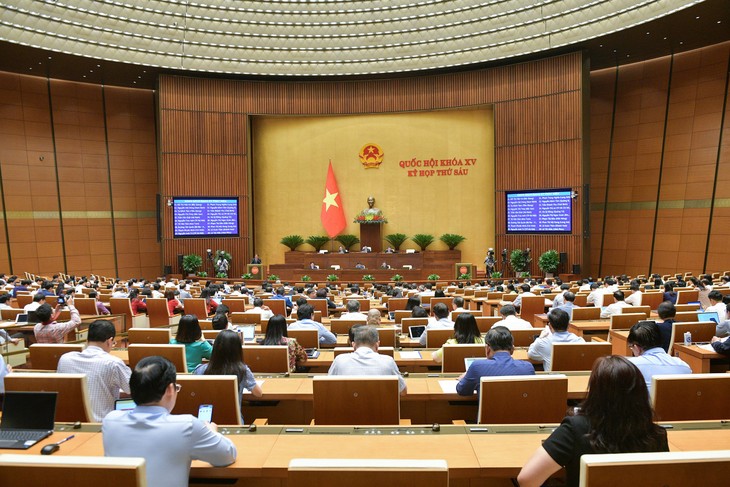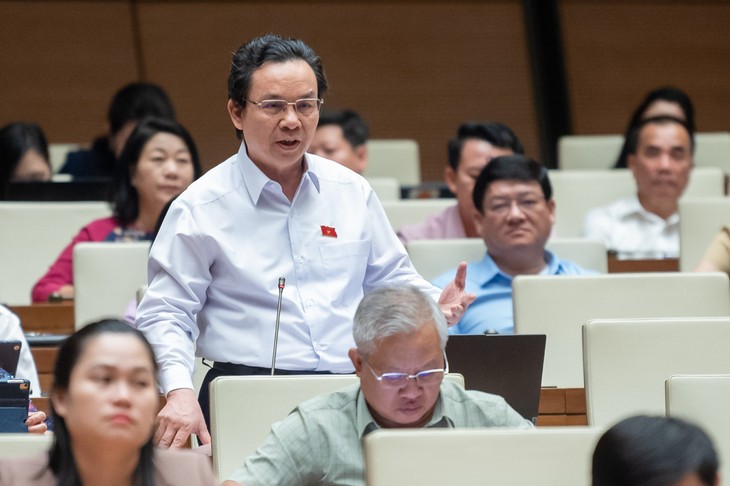(VOVWORLD) - At the ongoing National Assembly meeting in Hanoi, the draft revised Land Law and 8 other bills are being considered for approval. The revision of the Land Law shows Vietnam's strong determination to reform its land policy to meet practical needs.
 At the 6th session of the 15th National Assembly (Photo: quochoi.vn) At the 6th session of the 15th National Assembly (Photo: quochoi.vn) |
After 10 years of implementation, the 2013 Land Law has improved land management and use. Facing rapid economic development and international integration and the 4th Industrial Revolution, the Law has been revised with more specific and transparent regulations concerning compensation, resettlement support, land acquisition for purposes of national defense, security, and socio-economic development for national and public interests.
The draft revised law defines mechanisms to determine land prices according to market principles, financial policies on land management and use of agricultural land, and management of residential land and production land for ethnic minorities.
Social consensus
Before submission to the NA for approval, the draft revised Land Law was made available for public comment. The draft revisions concretize Resolution 18 of the 13th Party Central Committee on continuing to reform and fine-tune institutions and policies, improving the efficiency and effectiveness of land management and land use, and creating momentum to make Vietnam a high-income, developed country.
The draft revised law stipulates clearly policies to ensure residential land for ethnic minority people and policies on land allocation, and lease of residential land and production land for ethnic minorities, while strictly prohibiting changing land use purposes.
Deputy Minister of Natural Resources and Environment Le Minh Ngan said: “The draft revised law prohibits allocating, leasing, or changing use purposes of land reserves which are identified as land reserves for ethnic minority people but wrongly delivered. It is strictly forbidden for non-ethnic minorities to receive land which is supposed to be limited to ethnic minority people."
The engagement of the whole political system and people in the revision of the Land Law has created a consensus in an area that has a strong impact on the economy, society, and people’s lives. The draft revision received 12 million contributions, which reflects the public’s great interest in the issue. As a result, many changes have been made to align with public views.
Vietnam is determined to reform land policy
A key point of the draft revision is the market-based land price bracket, which demonstrates Vietnam's strong determination to reform land policy in order to remove prolonged land-related complaints, denunciations, and litigation.
 Associate Professor Dr. Hoang Van Cuong, Vice Rector of the National Economics University (Photo: quochoi.vn) Associate Professor Dr. Hoang Van Cuong, Vice Rector of the National Economics University (Photo: quochoi.vn) |
Associate Professor Dr. Hoang Van Cuong, Vice Rector of the National Economics University, said: "One of the breakthroughs made in Resolution 18 has been included in the draft revised Land Law – the abolition of the economic management mechanism by administrative measures. Typically, land prices must be close to the real market price and market tools such as tax tools will be used to regulate speculation."
The draft revised Land Law clearly stipulates the functions, tasks, and responsibilities of the agency responsible for determining land prices, supplements and fine-tunes regulations to ensure publicity and transparency of land prices, and requires land transactions be made on trading floors and payment made through banks. Removing the current land price bracket makes the compensation level for acquired land closer to the market price, thereby speeding up site clearance and project progress.
The draft revised Land Law also stipulates more specifically the authority, purpose, scope of land recovery, specific conditions, and criteria for the State to recover land for socio-economic development. It also fine-tunes the mechanism and financial policy on land, tax incentives, land use fees, and land rents based on the condition of each locality.
The draft revision creates favorable conditions for agricultural land users to change the purpose of crop and livestock production, strengthens administrative reform and digital transformation in land management and use, ensures centralized, consistent management and operation, and promotes connection and information sharing from central to local levels.
Land is an important resource for national development, directly related to all socio-economic activities and the needs of the people. Therefore, the related policies must be consistent with actual conditions and based on people’s needs. The adoption of the draft revised Land Law is expected to help unlock resources from land, ensuring harmony in the interests of the state, people, and investors.